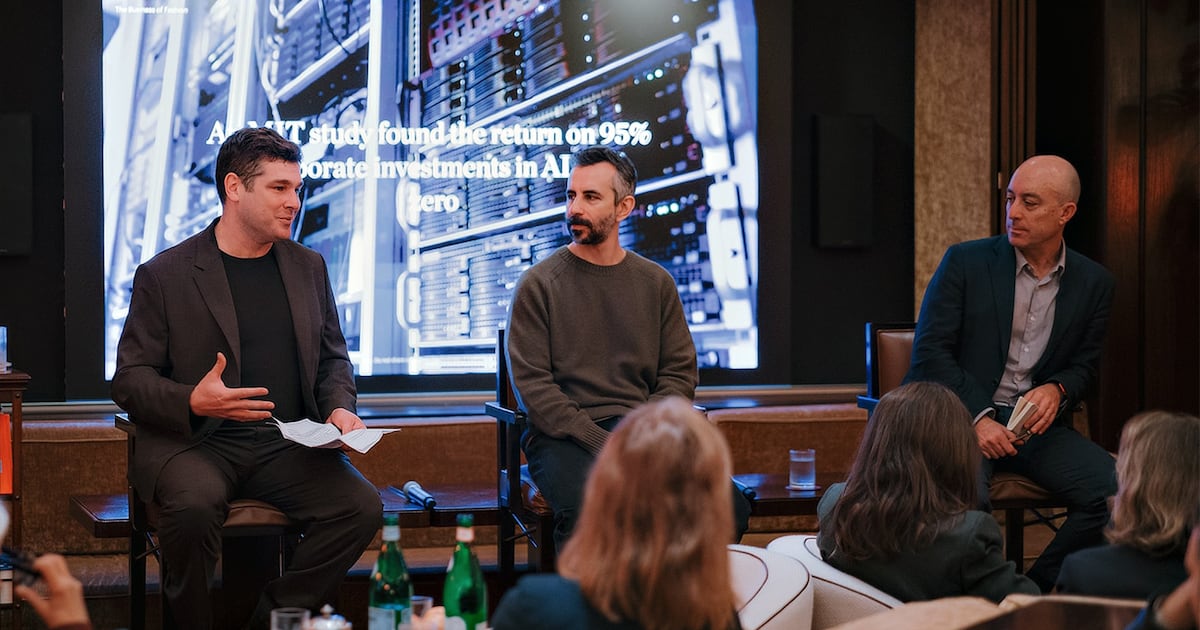At a roundtable hosted by The Business of Fashion for its executive members, senior leaders from a range of global companies shared insights and strategies about how they are engaging with AI and the lessons they are learning on this rapidly evolving technological and strategic journey.
BoF’s recent executive memo on Everything Executives Need to Know about AI served as the framework for conversation. Written by reports editor Marc Bain, the memo offers strategic solutions about how executives should think about AI so they can make decisions effectively.
Executive editor Brian Baskin led the discussion alongside Bain and Milan correspondent Eric Sylvers. Together, they unpacked the mindset of today’s fashion leaders navigating the rise of AI, exploring how trust, creativity and a critical mindset can guide brands through this period of technological transformation. While acknowledging the uncertainty that surrounds AI adoption, the team emphasised that progress depends on experimentation, patience and confidence in one’s business and people — not panic.
The intimate, closed-door breakfast was attended by senior leaders from Kering, CNMI, Ferrari, Marni, Fiorucci, Luxottica and many more. Below, we share condensed, anonymised insights with the BoF community and wider industry.
AI Adoption: From Curiosity to Necessity
The discussion opened with a survey of the room, mapping where companies currently sit on the AI adoption spectrum — from those yet to implement any tools, to those experimenting in pilot phases, and a small number already finding meaningful applications. While excitement around AI remains high, recent studies from MIT and Gartner highlight that many CEOs still express limited confidence in their leadership teams’ ability to execute AI strategies effectively.
Senior decision-makers are often eager to embrace innovation, while junior employees may have the technical skills but fear that automation could threaten their roles. Despite this, attendees agreed that AI has moved beyond abstract potential: it is already reshaping the fashion industry, offering tools to reconnect brands with consumers, streamline workflows and support more informed decision-making.
Personalisation as a Luxury Superpower
A key theme of the discussion was how AI is transforming personalisation, particularly for heritage brands whose value proposition rests on individuality and craftsmanship. Companies such as Zegna and Ferrari who rely on producing highly personalised products are great examples of how luxury can scale bespoke experiences through technology. Although executives are cautious as AI-driven personalisation can be taken too far and lead to a backlash from clients expecting personal attention. Despite this, some luxury groups are already experimenting with AI-driven mass personalisation, while others are deliberately observing the early adopters to learn from their successes and missteps before rolling out large-scale implementations.
The Human Edge: Critical Thinking in the Age of AI
At the core of the conversation was a recurring question: can AI replicate critical thinking?
Executives argued that while AI excels at efficiency and data-driven insights, it lacks the strategic nuance that comes from human experience. This divide raises questions about the future of work within the industry. Senior executives, who bring decades of strategic thinking, may feel insulated — but younger professionals face uncertainty. The conversation turned to how companies can train emerging leaders to become skilled “AI editors,” curating and contextualising outputs rather than competing with them.
Some participants said they now evaluate how junior team members prompt and guide AI systems, recognising that the value lies as much in the input as the output.
Bridging the Creative–Executive Divide
Rather than replacing intuition or artistry, these technologies are helping translate creative vision for future campaigns, runways and designs. And by rapidly generating options, highlighting trends, and projecting possible outcomes, AI supports collaboration between creative and executive teams. For many in the room, this represents a step toward a more integrated model — one that preserves the creative essence of fashion while providing clearer strategic alignment.
Hosted for Executive Members, Executive Roundtables provide opportunities to connect and collaborate with BoF journalists and senior leaders from the wider BoF community at intimate thought-leadership events in New York, London, Paris and Milan. To join our next event, become an Executive Member now.


